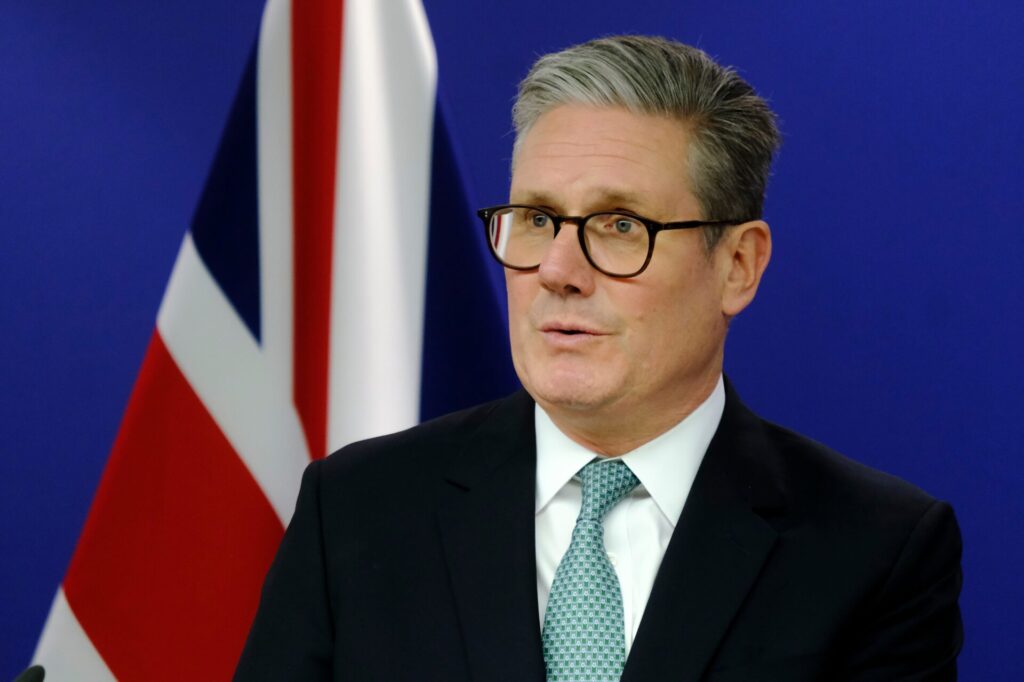The British government is actively working to negotiate a post-Brexit trade deal with the United States to avoid or mitigate tariffs that President Donald Trump is expected to announce next week.
This latest effort comes as Britain continues to seek new trade arrangements with the U.S. following its departure from the European Union in 2020.
While negotiations had previously stalled under the former Conservative Party leadership, current Prime Minister Keir Starmer of the Labour Party has renewed talks with President Trump.

Elon Musk Called This Financial News ‘Terrifying’
Starmer met with President Trump at the White House in February, leaving the meeting feeling optimistic about the possibility of reaching an agreement.
REPORTER: “Did our Prime Minister persuade you not to put tariffs on the UK?”
TRUMP: “He tried. He was working hard, I’ll tell you that. He earned whatever the hell they pay him over there. He tried.”pic.twitter.com/O526v0GtXK
— Libs of TikTok (@libsoftiktok) February 27, 2025
FREE Concealed Carry Gun Laws & Reciprocity Map
Following that encounter, Trump seemed to support the idea of a “great” deal that could help Britain avoid the tariffs set to take effect.
Recently, Business Secretary Jonathan Reynolds visited Washington to continue negotiations, and Starmer and Trump held another phone conversation earlier this week to further discuss the matter.
The urgency of these talks comes ahead of April 2, a date that Trump has referred to as “Liberation Day,” when he is expected to announce reciprocal tariffs on a range of trading partners, including the U.K. and the European Union.
While Trump has previously imposed tariffs on imports from Canada, Mexico, and China, the U.S. has not yet imposed tariffs on the EU, although Trump has indicated that such measures may be forthcoming.
In January, Trump told reporters, “Am I going to impose tariffs on the European Union? Do you want the truthful answer or should I give you a political answer? Absolutely.”
Trump’s statement underscored his long-standing concerns about trade imbalances between the U.S. and the EU, particularly in relation to the bloc’s practices. In December, Trump urged European nations to address these imbalances by purchasing more American energy, warning that failure to do so would result in tariffs.
As part of ongoing discussions, the U.K. government is exploring options to mitigate the impact of these anticipated tariffs.
Prime Minister Starmer confirmed earlier this week, “We’re engaged in discussions with the United States about mitigating the impact of tariffs.”
Finance Minister Rachel Reeves also indicated that Britain would not seek to “escalate” trade wars, marking a contrast to Canada and European nations, who have vowed to retaliate, despite already imposing tariffs on American goods.
For instance, the European Union levies a 10% tariff on American-made vehicles, while European cars entering the U.S. are subject to a much lower 2.5% tariff.
The U.K. government has described the potential agreement with the U.S. as an “economic prosperity deal,” though it has acknowledged that a comprehensive “free trade” agreement may not be achievable.
Jonathan Portes, a professor of economics at King’s College London, commented on the situation, saying, “Some type of arrangement that might let the U.K. escape some tariffs is possible but it would not be a full-scale trade deal.”
He added that Brexit provides the U.K. with more flexibility in negotiations, but also means that the country no longer carries the same weight in trade talks as it did while part of the EU.
Portes also warned that Britain must be cautious not to agree to terms that could complicate its trading relationship with the EU.
The ongoing trade discussions are further complicated by developments within the British auto industry. Rolls-Royce, the renowned British manufacturer, recently informed shareholders of its plans to move jobs and manufacturing operations to the U.S. to circumvent the looming tariffs.
The company has also indicated that it may reduce operations in Canada, Mexico, and China in response to Trump’s tariff policies.
Rolls-Royce’s warning to shareholders highlighted concerns that tariffs on key trading partners could lead to higher costs and disrupt global supply chains.
The company’s move reflects the growing pressure on British businesses to adjust to the evolving trade landscape shaped by Trump’s tariff policies.
As the U.K. continues to negotiate with the U.S., the outcome of these talks will have significant implications for Britain’s economic future, particularly in light of the looming tariffs.
While the potential trade agreement remains uncertain, British officials are working to ensure that they can avoid the worst impacts of Trump’s upcoming tariff announcements.
American Made Patriotic Apparel – Save 15% with Promo Code MERICA
The opinions expressed by contributors and/or content partners are their own and do not necessarily reflect the views of LifeZette. Contact us for guidelines on submitting your own commentary.

![Trump’s America First Trade Plans Just Proved the ‘Experts’ Dead Wrong [WATCH]](https://www.right2024.com/wp-content/uploads/2025/03/1742399120_Trumps-America-First-Trade-Plans-Just-Proved-the-‘Experts-Dead-750x375.jpg)




![Trump's Admin Guts Another ‘Rogue Government Agency with Zero Accountability’ [WATCH]](https://www.right2024.com/wp-content/uploads/2025/03/Trumps-Admin-Guts-Another-‘Rogue-Government-Agency-with-Zero-Accountability-350x250.jpg)
![‘We All Owe Him (Elon) a Huge Debt of Gratitude’ [WATCH]](https://www.right2024.com/wp-content/uploads/2025/03/‘We-All-Owe-Him-Elon-a-Huge-Debt-of-Gratitude-350x250.jpg)









